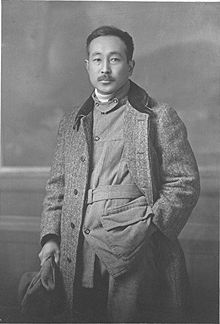Arishima Takeo
Arishima Takeo ( Japanese 有 島 武 郎 ; born March 4, 1878 in Tokyo ; † June 9, 1923 in Karuizawa ) was a Japanese writer who was influenced by the “humanistic” Shirakaba group, but because of his education and socio-political interests soon assumed a special position. For Stephen W. Kohl he was "probably the most brilliant and enigmatic member" of Shirakaba . At 45, Takeo committed suicide with a lover.
Life
The son of a former samurai and wealthy businessman from Tokyo first attended the agricultural school in Sapporo ( Sapporo nōgakkō , now part of the University of Hokkaidō ). In 1901 he converted to Christianity. During a postgraduate course (from 1903 to 1906) at Harvard University in the USA, however, he suffered a crisis of faith and, impressed by the writings of Walt Whitman , Henrik Ibsen and Pyotr Alexejewitsch Kropotkins , turned to socialism. After returning to Japan for a year in Europe, Takeo became an English teacher and founded the literary magazine Shirakaba (White Birch) with two other authors - Shiga Naoya and Mushanokoji Saneatsu , which lasted until 1923. She feels connected to both the young Japanese naturalism and the modern "Western" influences. According to Sybille Altmann, it has been a "key organ" of Japanese literary and artistic life in the 13 years of its existence. Takeo's first stories also appear in it.
In 1906 he met the trained singer Mathilda Heck (1877-1970) known as Tilda in Schaffhausen . The very personal correspondence between Arishima and Tilda lasted until a year before the end of his life.
Takeo married in 1910; however, his wife dies six years later and leaves him with three small children. His first novel, Kain no Matsuei (The Descendants of Cain) from 1916, received a lot of attention. Other spectacular steps follow on non-literary terrain. In 1922, Takeo transfers an inherited extensive land holdings at the foot of Mount Yotei to people who plan to cultivate it collectively. He accompanies this renunciation with the essay Sengen hitotsu (A Manifesto), in which he expressly professes himself to socialism, although he emphasizes that his class origins do not allow him to play a leading role in the struggle for it. On this property not far from the small town of Niseko (located in the south of the northernmost peninsula of Japan's Hokkaidō ) the Arishima Takeo Memorial Museum was built in 1977 (on the occasion of the founder's 100th birthday) , which, according to the local website, plays an important role in promoting and spreading regional culture plays.
In 1922, Takeo met the journalist Hatano Akkiko , a married woman. The illegitimate love affair between the two leads (in Takeo's country house in Karuizawa ) to a double suicide the following year. Strangely enough, it was preceded in 1919 by Takeo's highly acclaimed novel A Woman , which depicts the failure of a woman who lives outside social conventions. And even during his student days in Sapporo, it is said, Takeo tried to commit suicide with a lover (Morimoto Kokichi).
Arishima's younger brothers were the painter Arishima Ikuma and the writer Satomi Ton . His son was the well-known actor Masayuki Mori .
Works
- 1916 Cain no Matsuei
- A descendant of Cain . Translated by Jürgen Berndt. In: Dreams of Ten Nights. Japanese narratives of the 20th century. Eduard Klopfenstein, Theseus Verlag, Munich 1992, pp. 86–128. ISBN 3-85936-057-4
- 1918 Umareizuru Nayami ( 生 れ 出 づ る 悩 み , The Agony of Coming into Existence)
- 1919 Aru onna (A Woman), novel
- 1920 Oshiminaku ai wa ubau (Love Robs without Hesitation)
- 1922 Sengen Hitotsu ( 宣言 一 つ , A Manifesto), essay
-
Gaisen ( 凱旋 )
- German “Triumph”, translated by B. Matsumoto, in: Stories and Stories from Japan, 1950, pp. 143–155
literature
- Paul Anderer: Other Worlds: Arishima Takeo and the Bounds of Modern Japanese Fiction , Columbia University Press, New York 1984
- Leith Morton: Divided Self: A Biography of Arishima Takeo , Allen & Unwin, Winchester / Massachusetts 1988
- Verena Werner: Arishima, Takeo. In: Historical Lexicon of Switzerland .
- Rene Specht: Arishimi Takeo and Arishima Ikuma and their Swiss artist friends , magazine of the Swiss Asian Society, vol. 55, 2001, pp. 37–50
- Verena Werner: Arishimi Takeo and his correspondence with Tilda Heck , magazine of the Swiss Asian Society, vol. 55, 2001, pp. 51–61
- Arishimi Takeo, translated by Verena Werner: Letters to Tilda Heck , Journal of the Swiss Asian Society, Vol. 55, 2001, pp. 62–130
Web links
Individual evidence
- ↑ See this website , accessed December 30, 2010
- ↑ See this website ( Memento of the original dated February 26, 2005 in the Internet Archive ) Info: The archive link was inserted automatically and has not yet been checked. Please check the original and archive link according to the instructions and then remove this notice. , accessed December 30, 2010
- ↑ See this website , accessed December 30, 2010
- ↑ in the article on the English language Wikipedia , accessed on December 30, 2010
| personal data | |
|---|---|
| SURNAME | Arishima, Takeo |
| ALTERNATIVE NAMES | 有 島 武 郎 (Japanese) |
| BRIEF DESCRIPTION | Japanese writer |
| DATE OF BIRTH | March 4, 1878 |
| PLACE OF BIRTH | Tokyo |
| DATE OF DEATH | June 9, 1923 |
| Place of death | Karuizawa |
